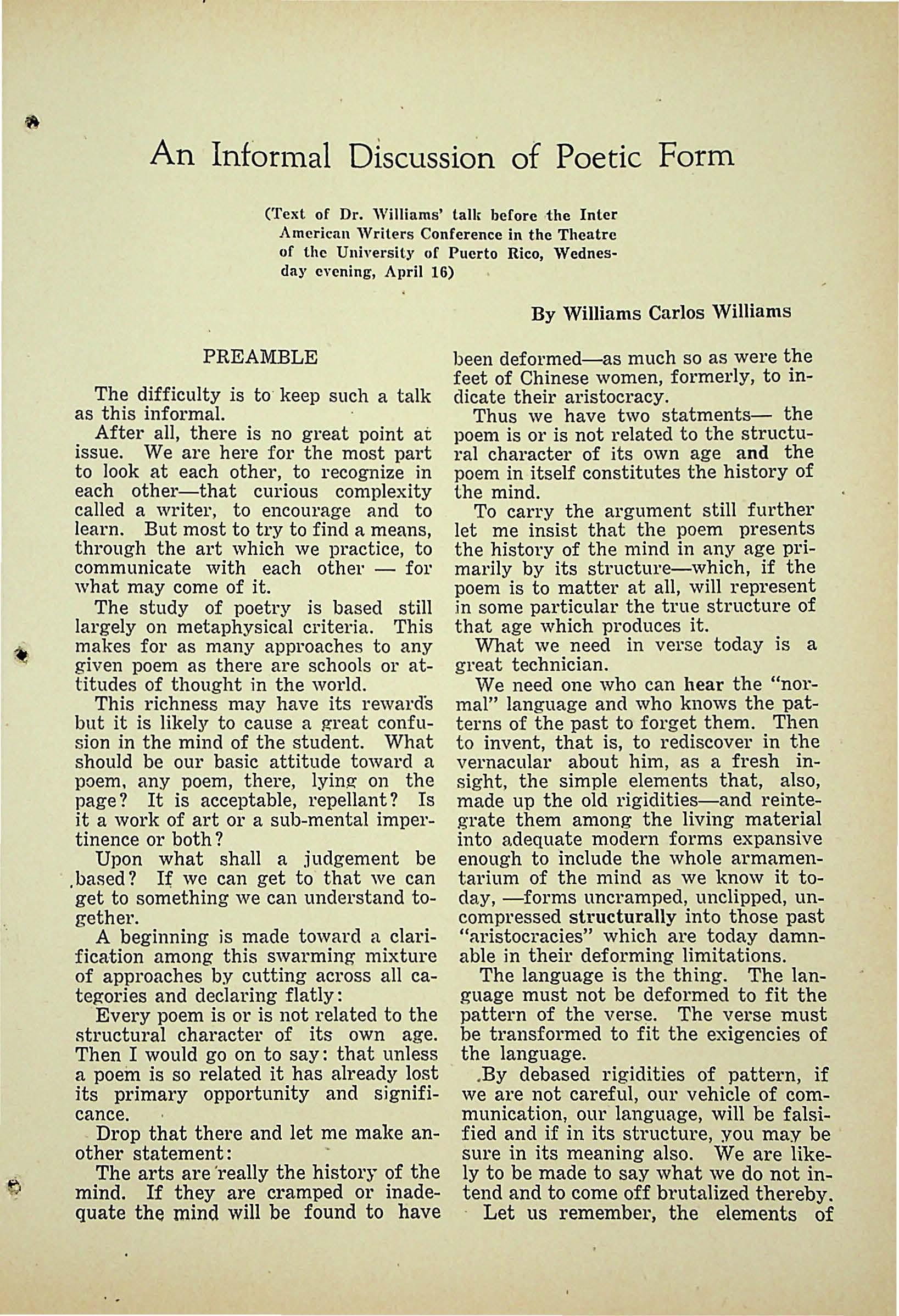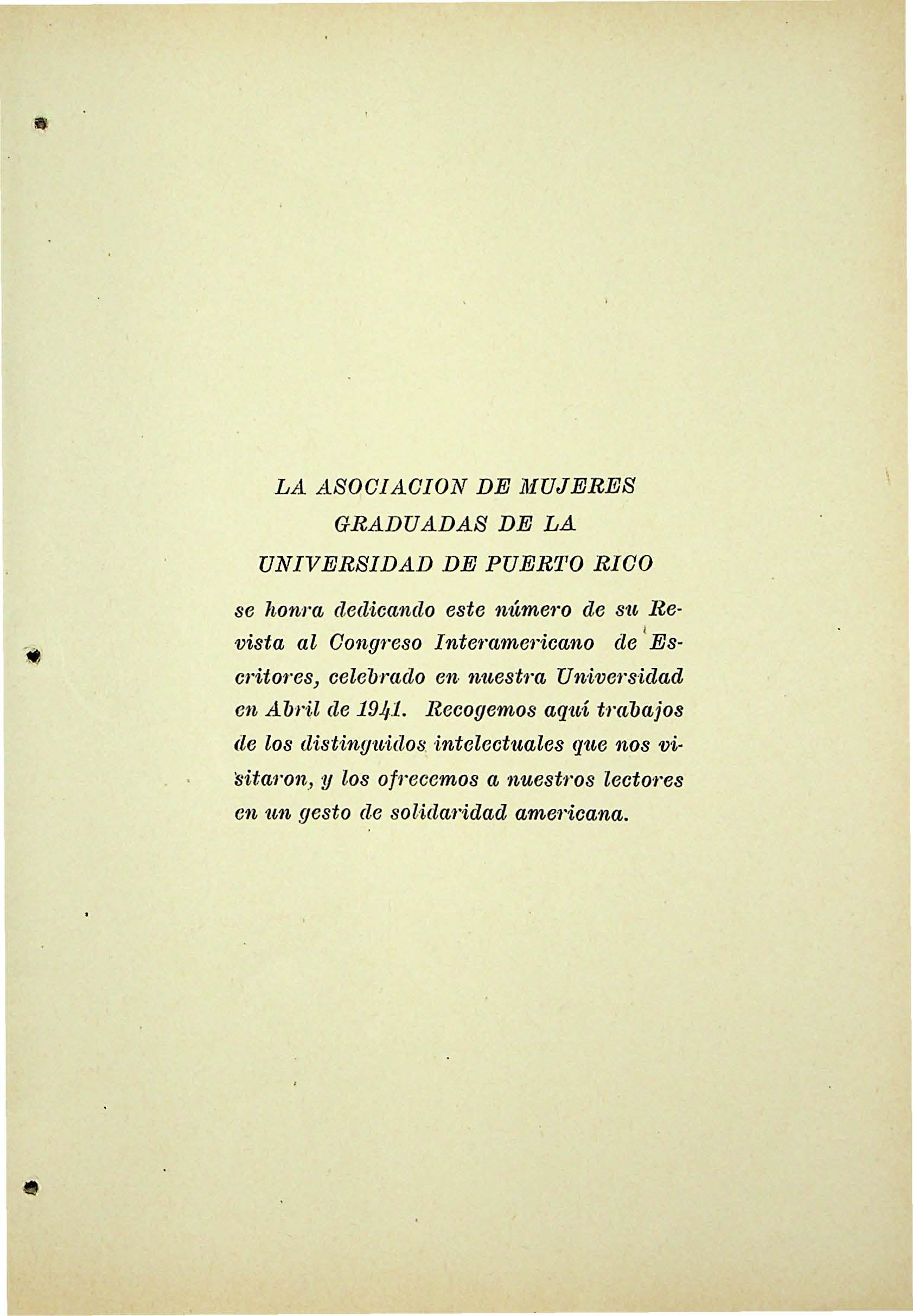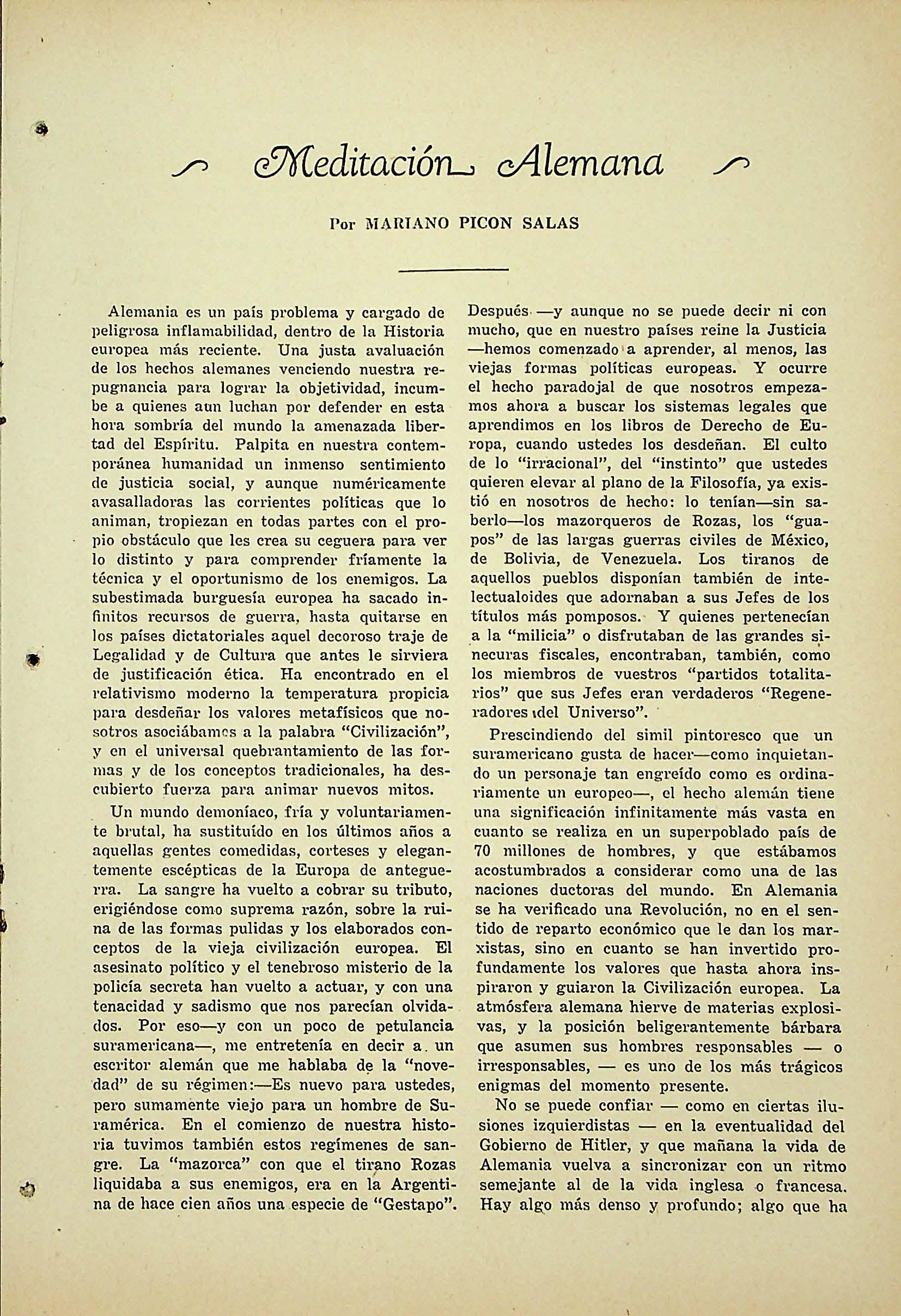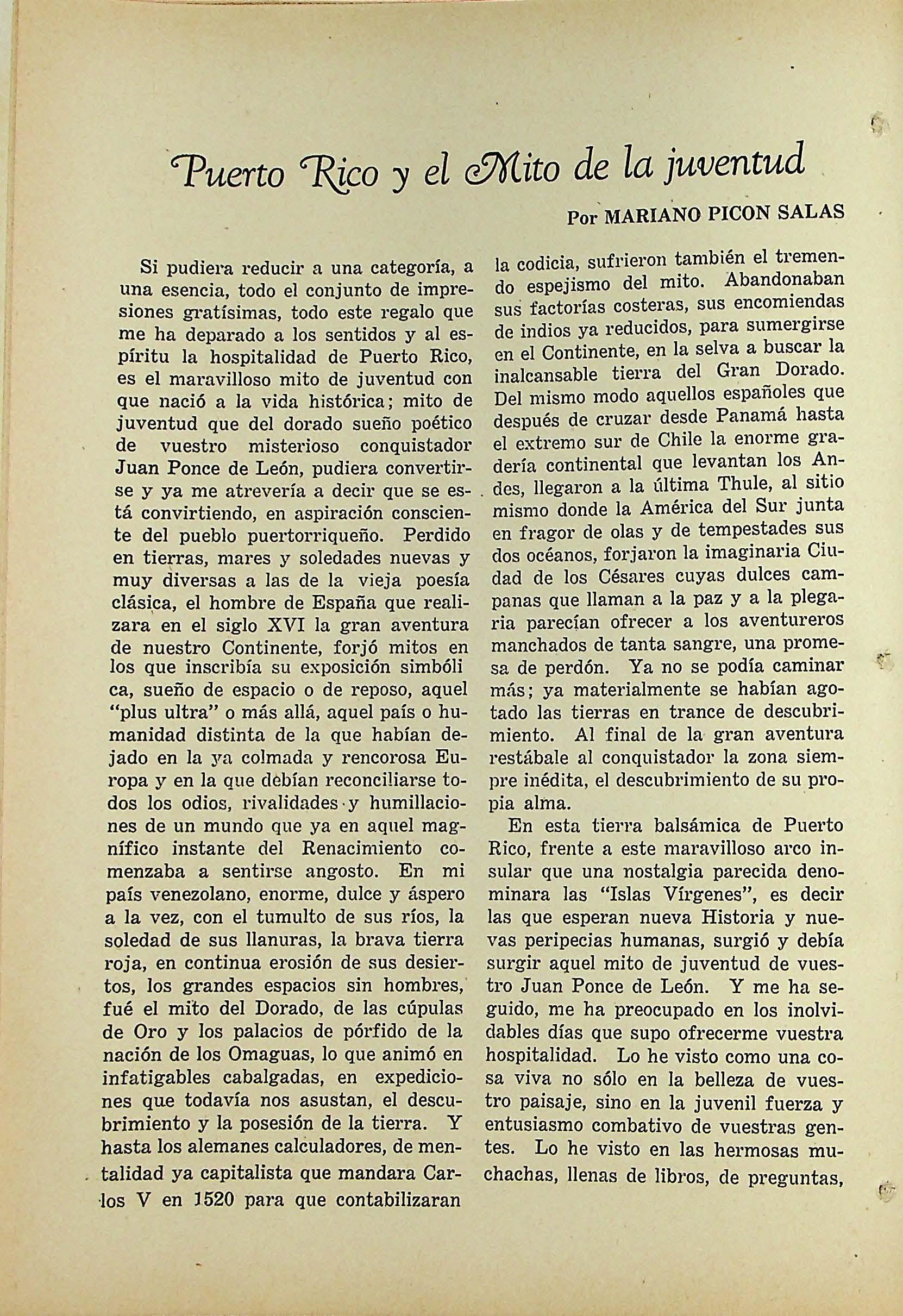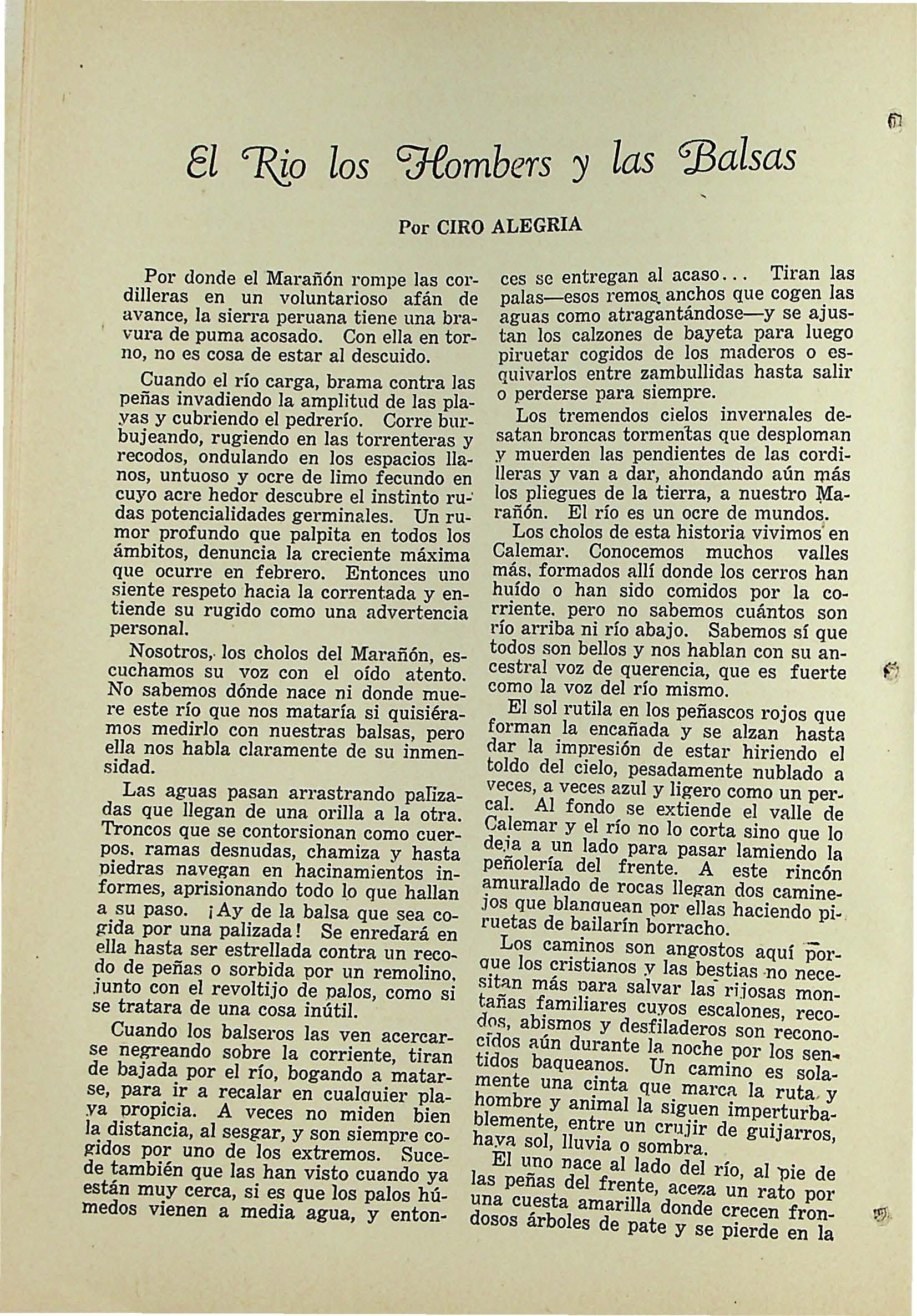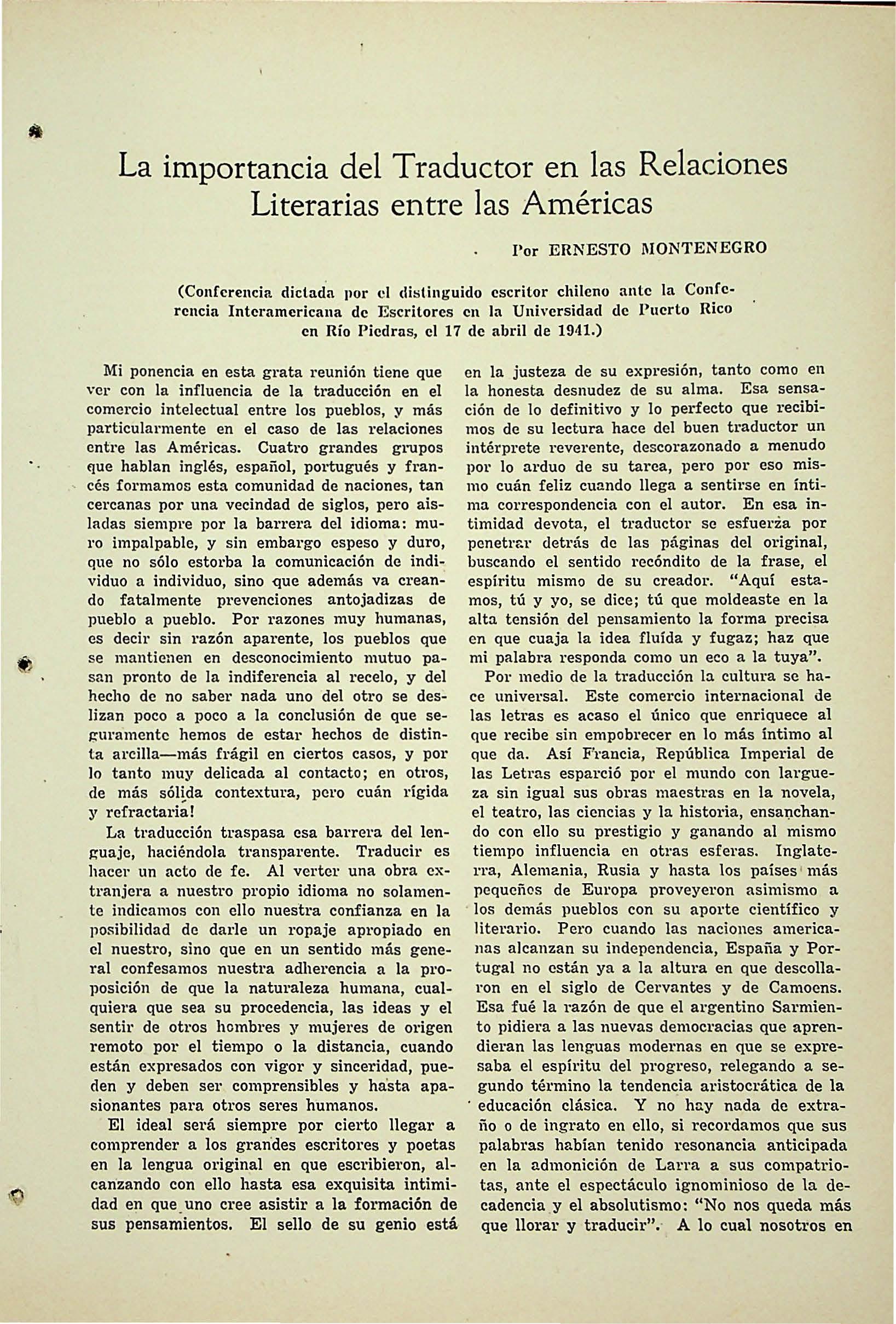
28 minute read
Robert Morss Lovett
Shakespeare in Relation to this Age
(An address delivered before the Inter Ameri· c:m "'riters Conference in the University of Puerto Rico, Río Piedras, April 21, 1941)
By ROBERT MORSS LOVETT
It is recognized as one of the crudest of ercorresponding to that which in Italy and rors to attach explicit meaning to the dates France had already taken place. In England which mark the divisions in historie time the impact of the Renaissance was delayed whlch we call centuries or decades. Neverby the remoteness from cente1·s of European thelcss, when l\'lrs. Virginia Wolf remarked culture in Italy, and especially by the fifty that human nature underwent a total change years of civil strife known as the Wars of in 1910, the assertion carries a challenge the Roses. With the sixteenth century the which on examination turns out to yield a cercountry felt almost simultaneously the exhitain me:ming. There is no magic in the laration of the rebirth and the stimulus of the ciphers which mark 500 B. C., or 1400, or 1500, Reformation. The period was one of inmense · or 1600, or 1700, or 1800 A. D. and yet we are expansion. It was naturally followed by one conscious of a definable quality in the great of reaction and concentration, as an epoch of íifth century before Christ, though we think creation is followed by one of assimilation and of it as beginning in 490 with thc Battle of criticism. Th:e sixteenth century in England lifara thon, and we recognize a specific charnearly coincided with the reign of the Tudors; acter and significance for civilization in the the seventeenth century with thc rule of the quat.ro cento :rnd its successors the sixteenth, Stuarts-and no one is likely to confuse Tudor seventeeth, nnd eighteenth centuries. Usualwith Stuart England in architecture, painting, ly some imporbmt event is to be noted near music, literature, or general mood and thougl1t enough to the calendar opening of the centuany more than in religion, economy, domestic ry to stand out as a signa! of the secular politics or foreign policy. change. Such an event for England was the Shakespeare was a man of both epochsdeath of Queen Eliz¡ibeth and the accession that of the Renaissance, and that of the postof J:imes I in 1603. Preliminary signs of Rennissance, when the brightness of the morchange there had been, but with this event ning of the rebirth was fading into the sober they multiply and become no longer harbincolo1·s of afternoon preceding a stormy sungers and anticipations but recognizablc charset. He lived in his youth and yonng manacteristics of n new age. And this date marks hood as an Elizabethan, sharing the hopes with similar exactness a change in thc mood and enthusiasms of that brilliant ago, among nnd expression of the greatest man then living the great figures who in true Renaissance in England. The year 1603 bisects Shakesfashion seemed to transcend in life or in peare's career as a dramatist. On one side thought the ordinary limits of human capawe have the early comedies, as a culmination the bright the ancl histories, ami happy group city or achievement, Raleigh, Sidney, lowe, Spencer. He carne into his prime Maras a of plays, The l\ferchant of Venice, As You Jacobean, when doubts and hesitations were Like It, we have Twclfth N'ight. On the other whnt have been termed the harsh side and bringing poraries a palsy upon were men of action, lesser and his contemstature, Donne, bitt:er comedies, notably J\feasure for and the great series of tragedies, Lear, Othello and l\lacbeth. Measure, Hamlet, Fletcher, Ben Johnson. The which ocurred in the matter work has been attributed to profound change and spirit of his the circumstance
Thc differences between the sixteenth and sevcnteenth centuries may be traced th1·ough011t Europe. but in England the change is of his personal life-the death of his son Hamnet, the betrayal and disillusionment in love which is a theme of the sonnets. It is to be strongly marked as to post a transition from high
Renaissance-a change noted, lowing howevcr, that it was in the years folthese misfortunes that Shakespeare
DE LA UNIVERSIDAD DE PUERTO RICO

produced his happiest comedies. There is ina value as propaganda. He was deeply comdccd no greatcr fallacy than to interpret a mitted to the cause of Essex through his dramatist's work in terms of his personal forfriendship with the Earl of Southamption, tunes. It is, howevcr, legitimate to see in who was Esscx's Iicutenant. Thc play Henry that work a reflection of the psychological V was cmasculated by thc censor bccause the cnvironment in which he lives. Especially a chorus celebrating Henry's i·eturn from dramatist who owed his contemporary success France containcd a tribute to Essex on his to his responsiveness to the intercst of his less glorious rcturn from Ireland. The play public, cspecially a dramatist so sensitive to Richard II, with its sad story of thc deposicurrents of thought and feeling as Shakestion and death of kings, was thought to be so peare was, we expect to find reflccting thc dangerous in bringing to the minds of thc marked change in the character between the pcople the possibility of removing a sovereign two successive cpochs in which he livcd. that its performance was forbidclcn. It was
A dominant characteristic of the sixteenth illegally acted before Esscx and his men on ccntury in England was patriotism and a sense thc evening beforc their mad attempt to take of national unity which carried the country thc city of London in 15QO. Thc Earl of Souththrough the storms of the reformation withampton paid the players out cf his own pocket out civil war, which reached its highest peak for their risk. in the enthusiasm which gathered about the But apart from and transceding ali this p1·epcrson of Elizabeth as the symbol of national occupation with politics was Shakespeare's depride. Lord Howard of Effingham, the admivotion to England which he shared with his ra! in command of the fleet which defeated countrymen, i·aised to enthusiasm by the sense the Armada was a Catholic. Philip Stubbs of national danger and deliverance. No utwas a puritan who when his right hand was terance of pah·iotism ever surpassecl in fervor strnck off for non-conformity, snatched off his the dying speech of J ohn of Gaunt in Richard hat with his left and cried "God save the II. Queen". In the next century we find the country sp!it between Cavaliers and RoundThis ro.ya! throne of kings, this scepter'd islc, hcads ; and the king, so far from being a This earth of majesty, this seat of Mars, symbol of unity, becomes one of division, loThis other Eden, demi-paradise; sing-in one case his head, and in an?ther This fortress built py Nature for herself his crown. Against infection and the hancl of war;
The great bulk of Shakespeare's work in This happy breed of m.en, this !ittle wor.lcl; his earlier was directly connected with This precious stone set in the silver sea, t.his theme of national unity, treated through Which serves it in the office of a wall, thc splendid series of history plays from RiOr as a moat defensive to a house, chard II through the three Henrys to Richard Ágainst the envy of less happier lands; III. All these plays the national This blessed plot, this earth, this realm, this tragedy of a disputed succession in the Wars (England, of the Roses. One reason for the popular ac'l'his 1mrse, this teeming womb of royal kings, ceptance of the Tudors in spite of their detestFear'd by their breed, and famous by their able personal characters was that they saved (birth, England for a century from this tragedy. EliRenowned for their deeds as far from home,- popularity was pa1·tly dependent on For Christian scrvice and true chivalry,- her repeated negotiations for marriage and As is the sepulchre in stubborn Jewry, the hope which they gave the country of an Oí the world's ransom, blessed Mary's son,- heir to the throne. When this hope faded even Elizabeth's security was threatened. The In this passage we see reflected Shakesclaim of the Earl of Essex to the succession peare predominant, political conception-a bewas taken seriously because of the general deIief in monarchy by divine right as a cause sire to have something settlcd before Elizaand a symbol of national greatness i·eflected bcth's dcath, and after Elizabeth had cxin human greatness. It was a conception tinguished that claim on the scaffold thc same characteristic of the política! thought alike of deslrc was responsible' for acquiescence in the Renaissance and of the seventh century, thc accession of the Scottish king. In all this but in the earlier period Shakespeare could political 8kil'mishing Shakespearn's plays had look on the king as the guardian and saviour
of his pcoplc, a sacrificc for them. Henry V, was Shakespcare's ideal king, never more so than in this soliloquy in which he dwells upon lhc rcsponsibilities which he must bear alone.
Upon the king!-lct 11& 011r lives, our sonls, Our debts, our cnrcful wives, our children, and Our sins lay on thc king! We must bear ali. O hard condition, twin-born with greatness, S11bject to the breath of cvcry fool, Whose sense no more can feel but his own (wringing! What infinite heart's-ease must kings neglect That private men enjoy! And what ha ve kings that private ha ve not too, Save ceremony, save general ceremony? ... Tis not the balm, the sceptre, and the hall, The sword, the mace, the crown imperial, The intertissued robe of gold and pearl, The forced title running 'fore the king, The throne he sits ·on, nor the tide of pomp That beats upon the high shore of this world. No, not ali these, thrice gorgeous ceremony, · Not all these, laid in bed majestical, Can sleep so soundly as the wretched Who, with a body fill'cl and vacant mind, Gots him to rest, ci·am'd with distressful Ne ver sees horrid night, thc child of hell; But, like a Jackey, from the rise to set Sweats in the eye of Phocbus, and all night Slecps in Elysium; next day, after dawn, Doth rise and help Hyperion to thfa horse; A nd follows so the ever running-year, With profitable fabour, to his grave: And but for ceremony, such a wretch, Winding up days with toil and nights with (sleep Had the fore-hand and vantage of a king. The slave, a member of the country's peace, Enjoys it; but in gross brain Iittle wots What watch the king keeps to maintain the (peacc Whose hours the peasant best advantages.

In the period which follows we find no suc11 dignified conception of kingship. The kings in Hamlet, l\facbeth and King Lear show the degradation of monarchy: ali are lords of misrule, symbols of disunity in their realms. In Hamlet the tiiumph of young Fortinbras has been cited as a happy ending in that a real king, a Henry V, has descended on the scene, and as showing Shakespeare's glorification of the man of action over the man of thought, but surely Hamlet's praise oí Fortinbras is selí directed irony. In Coriolanus we see the collnpse of Shakespeare's . political faith, the brenking down of the conception of leadership through ·personal greatness.
Faith in kingship and in national unity was not the only loss which the seventeenth century nnd which Shakespeare suffered with his time. A dominant theme in Elizabethan poetry was !ove, and truth in !ove or coustancy was thc great motive in thc long array oí sonnet cyclcs, beginning with Astrophel and Stella. Shakespeare's early plays contain notable examples of what we cnll true love-Benedick and Bcatrice in Much Ado about Nothing, Rosalind and Orlando in As You Like it, Romeo and Juliet, Katharine and Pctruchio in The Taming of thc Shrew, Viola ilf Twclfth Night. No theme called forth Shakespear's young eloquence more winningly than this, as witness the second scene oí Act II in Romeo and Jnlict. The most reasoned discourse on this theme is as we should expect that of Portia in The Mcrchant of Venice.
You see me, Lo1·cl Bassanio, where I stand, Such as I am: though for myselí alone I would not be ambitious in my wish To wish myself much bett.er; yet for you I would be trebled twenty times myselí; A thousand times more fair, ten thousands (times More rich; That only to stand in high in your account I might in virtues, beauties, Jivings, friencls, Excced account: but the íull sum oí me Is sum of something, which, to term in gross, Is an unlesson'd girl, unschool'd, unpractis'd: Happy in this, she is not yet so old But she may learn; and happier than this, She is not bred so dull but she can learn; Happiest oí ali is, that her gentle spirit Commits itselí to yours to be directed, As from her lord, her governor, her king.
Shakespeare had, it is clear, a shattering expe1ience in !ove, yet he has left in the midst of the record oí it the most straightforward and emphatic cxpression of l1is own faith in sonnet CXVL:
Let me not to the marriage of true minds Admit impediments. Love is not ]ove vlhich alters when it alteration finds, Or bends with the remover to remove: O no; it is an ever-fixed mark That looks on tempests, and is never shaken; It is the star to every wandering bark,
DE LA UNIVERSIDAD DE PUERTO RICO

Whose worth's unknown, although his height be contemplated with heart searching cloubt, (be taken. ·culminating in morbicl fear. Preocupation Love's not Time's fool, though rosy lips and with death is a function of self consciousness. Within his bending sickle's compass (checks come; Again John Donne must ness to this terror of be citecl as first witdeath which became Love alters not with his brief hours and weeks, more pervading as the century advanced. Ilut bears Ií this be it out error, even to the edge of doom. and upon me prov'd, Death is a necessary acljunct of tragedy and no one usecl it more lavishly than ShakcsI never writ, nor no man ever lov'd. peare in his early dramas of the school which has been entitlcd the tragedy of blood, but
In no respect is the change from Elizabeonly in thc later plays do we find that morthan to seventeenth century more apparent bid dwelling on death which is the product of than this in the theme change of attitude of constancy. It of is poets as if toward in the intense self-consciousness.. soliloquy of Hamlet is too
The well known hackeyed for quosearch for novelty they determined to reverse tation, but it is exactly the illustration needthe doctrine and preach inconstancy as a vired, in its tone of sombre contemplation antitue. J ohn Donne was a leader in this innocipating Sir Thomas Browne. I quote the last vation, followed with reckless cynicism by the lines, ancl remind you that "conscience" obCavalier. Now the conception of !ove in viously means consciousness. Shakespeare's plays of the new century is quite in accord with the new fashion. In All's Well That Ends Well we have !ove captured by a trick repeated in Measure for Mensure, which is a comedy of disloyalties. Troilus and Crcssida, however, must take first place among the plays of disilusionment with !ove not cxcepting Anthony and Clcopatra Thus conscience does make cowards of us ali; And thus the native hue of resolution Is sickled o'er with the pale cast of thought; And enterprises of great pith and moment, With this regard, their currents turn awry, And lose the name of action.- which might be taken as a satire on constancy. Tt is significant that Anthony and Clcopatra The difference in mood between the sixfurnished a favorite theme in the seventecnth tecnth ancl seventcenth centuries may be sumr.entury, in Drydcn's play, Ali for )ove and a med up in a word. The mood of the sixtecnth world well lost. ccntury was optimism. The mood of the
A theme of as frequent recurrencc as love seventeenth century was one of increasing is death, and equally a test of the change in pessimism. I have nlready suggested one which Shakespeare participated. The typical cause of this in the political situation in EnElizabcthan attitude was one of joy in the irland and in Europe, complicated by the reprcsent world with calm confidence in the li¡rious controversy which was to acld a fury worlcl to come. Death helcl no tenor for this of fanaticism to war. But decper than this assured faith. Moreover, the Elizabethan age was a wholly natural reaction from a time of was impersonal in the sense that the great great deeds and greater hopes to one of dismen of that cpoch were too deeply absorbed appointment and disllusionment, a worldin large conceptions ancl achievements to conwcariness in which nothing seemed worthcern themselves over much about the details while. The sixtecnth century was in !ove of their expe1·ienccs, including death. It was with life: the seventeenth in spite of fear was an age of action rather than thought. Consitrying to be in love with death, the inevitable. dcr how !ittle wc know ancl with what painThis pessimism is an intellcctual wt>llschmcrz ful scholarship acquired, of the personal lives in Hamlet. of Spenser, Marlowe, Raleigh, or Shnkespeare himself, compared with the wealth of knowI have of late,- but whercfore I know not, lcclge we possess of Milton, Clarendon, Sir lost ali my mirth, forgonc ali custom of Thomas Browne. Seventeeth century literaexercises; and, indeed, it goes so heavi!y ture in England is large!y biography and autowith my disposition that this goodly frame, biography. It was an age of self consciousthe earth, seems to me a sterile promonness, of self study, intensified by the permeatory; this most excellent canopy, the air, tion of the Puritan spirit which quenched delook you, this brave o'erhanging firmament, light in the present and made the future to this majestical roof fretted with golden
54
firc, - why, it appears no othcr thing to me t.han a foul and pestilent cong1·egation of vapours. What a picce of work is man! How noble in reason! how infinite in facul· tics! in form and moving, how cxpress and admirable! in action, how like an angel! in apprchension, how like a god! the beauty of the world! the parngon of nnimals And yct, to me, what is this quintessence of dust? man dclights not me; no, nor woman neither.
I am not, of course, saying that Hamlet is Shakcspcare, but rather that the clmracter of Hamlet would have been inconceivable to Shakespeare the Elizabethan. This weariness becomes a complete and devastating arraign· ment of lifc in M acbeth. Tomorrow, and tomo1·row, and tomorrow, Creep in this petty pace from day to day To the last syllable of recordcd time; And ali our yesterdays have lighted fools The way to dusty death. Out, out brief can· (die! Life's but a walking shadow; a poor player, That struts and frets his hour upon the stage, And then is heard no more! it is a tale Told by an idiot, full of sound and fury, Signüying nothing.
Doubtless, there are many who will exclaim at this point that these quotations mark Shakespeare as a man of our age as well as of seventeenth century. And indeed that century had much in common with our own. Shakespeare contemplated social change in the spirit of a conservative of our own day. This social philosophy is expressed in the speechcs of Ulysses in Troilus and Crcssida. cspecially his realization of the weakness of social bonds \vith the decline of monarchy and hierarchy, and this philosophy is the classic conservatism of ali time. He must have liked to hear Ulysses talk-else why did he Jet him talk so long? His opposition to revolution, and to the rule of violence in human affairs which was to come to Europe immediately after bis death, appears in the speech which we cannot help feeling was written, like the tragedy oí King Lear, in protest against the decay of authority in thc last days of Eliza. beth.
How could communities, Degrees in schools, and brotherhoods in cities, Peaceíul commerce from dividable shores, The primcgcnitive and due of birth, Prcrrogative of age, crowns, sceptres, lnurels, But by degrec, stand in authentic place? Take but degree away, untune thnt string, And, hark, what discord follows! each thing (meets In mere oppugnancy: thc bounded waters Sould lift their bosoms higher than the shores, And make a sop of ali this solid globe: Strength should be lord of imbecility, And the rude son should strike his father dead: Force should be right; . or rather, right and (wrong,- Between whose endless jar justice resides,- Should lose their names, and so should · justice (too. Then everything ineludes itself in power, Power into will, will into appetite; And appetite, an universal wolf, So doubly seconded with will and power, Must make perforce an universal prey, And last eat up himself.
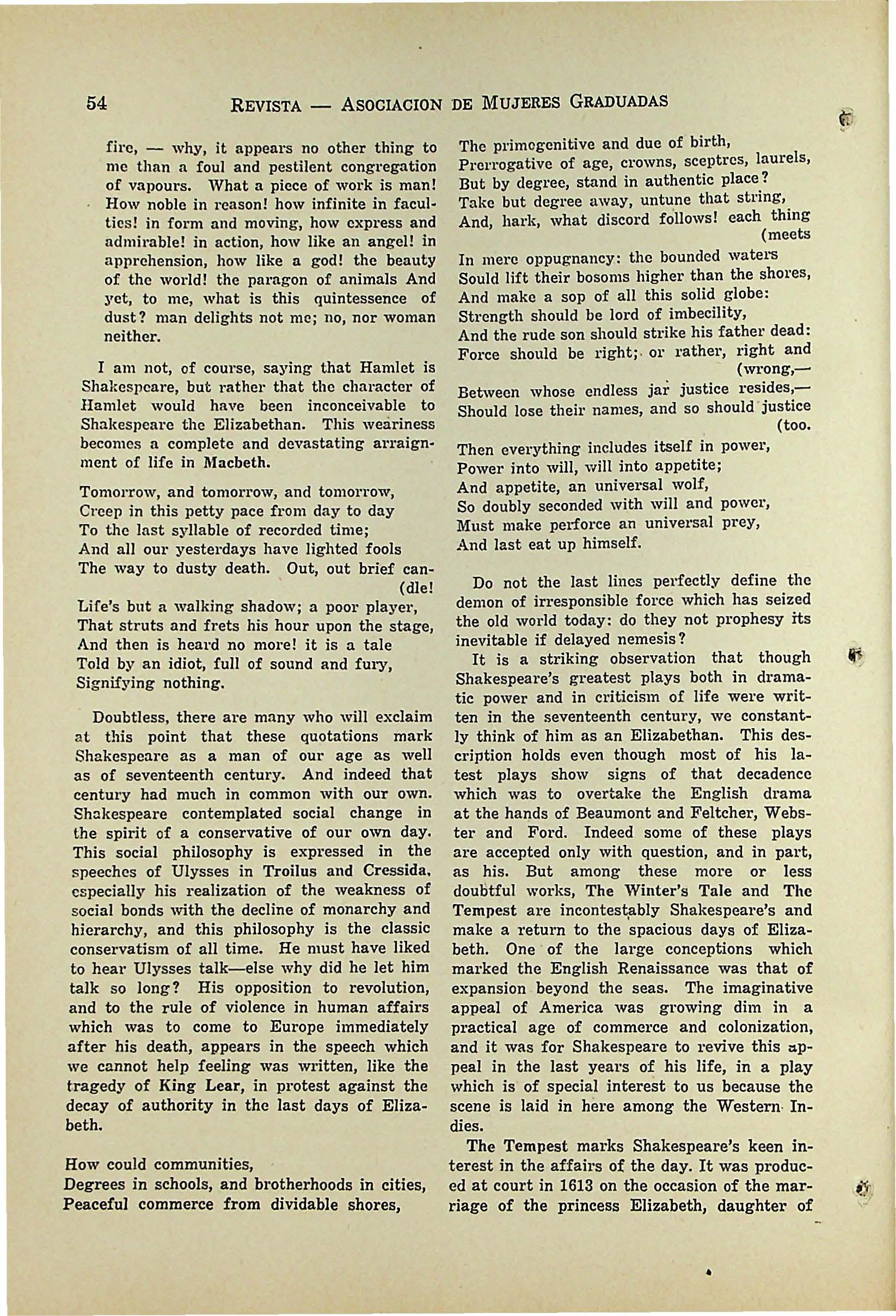
Do not the last lincs perfectly define the demon of irresponsible force which has seized the old world today: do they not prophesy its inevitable if delayed nemesis?
It is a striking observation that though Shakespeare's greatest plays both in dramatic power and in criticism of life were written in the seventeenth century, we constan t. ly think of him as an Elizabethan. This description holds even though most of his latest plays show signs of that decadencc which was to overtake the English drama at the hands of Beaumont and Feltcher, Webster and Ford. Indeed sorne of these plays are accepted only with question, and in part, as his. But among these more or less doulltful works, The Winter's Tale and Tite Tempest are incontest,ably Shakespeare's and make a 1·eturn to the spacious days of Eliza. beth. One of the large conceptions which marked the English Renaissance was that of expansion beyond the seas. The imaginative appeal of America was growing dim in a practica! age of commcrce and colonization, and it was for Shakespeare to revive this appeal in the last years of his life, in a play which is of special interest to us because the scene is laid in here among the Western· Indies.
The Tempest marks Shakespeare's keen in· terest in the affairs oí the day. It was produced at court in 1613 on the occasion oí the marriage of the princess Elizabeth, daughter of
DE LA UNIVERSIDAD DE PUERTO RICO
55
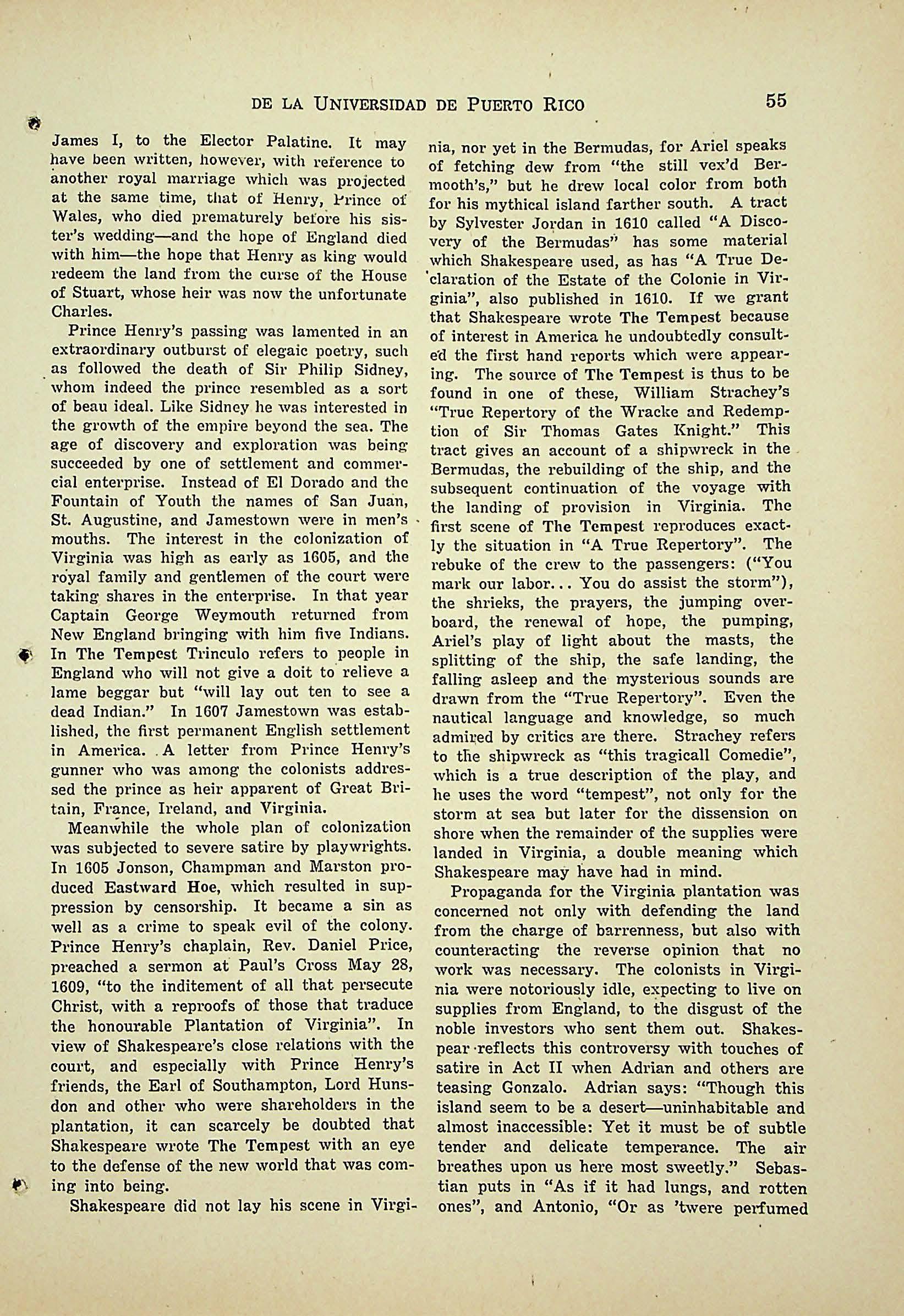
· James I, to the Elector Palatine. It may have been wl"itten, however, with reference to another royal marriage which was projected at the same time, that of Henry, l'rincc of Wales, who died prematurely befoi·e his sister's wedding-and thc hope of England died with him-the hope that Henry as king would redeem the land from the curse of the I-Iouse of Stuart, whose heir was now the unfortunate Charles.
Prince I-Ienry's passing was lamented in an extraordinary outburst of elegaic poetry, such as followed the death of Sir Philip Sidney, whom indeed the princc resembled as a sort of beau ideal. Like Sidne.y he was interested in the growth of the empire beyond the sea. The age of discovery and exploration was being succeeded by one of scttlement ancl commercial enterprise. Instead of El Dorado and the Fountain of Youth the names of San Juan, St. Augustine, and Jamestown were in men's mouths. The interest in the colonization of Virginia was high as early as 1605, and the royal family and gentlemen of the court werc taking shares in the cnterprise. In that year Captain George Weymouth returncd from New England bringing with him five Indians. In The Tempcst Trinculo refers to people in England who will not give a doit to· i·elieve a lame beggar but "will lay out ten to see a dead Indian." In 1607 Jamestown was established, thc first permanent Eng·lish settlement in America . . A letter from Prince Henry's gunner who was among the colonists addressed the prince as heir appa1·ent of Great Britain, France, Ireland, aud Virginia.
Meamvhile the whole plan of colonization was subjected to severe satire by playwrights. nia, nor yet in the Bermudas, for Ariel speaks of fetching dew from "the still vex'd Bermooth's " but he drew local color from both for his :nythical island farther south. A tract by Sylvester Jordan in 1610 called "A Discovcry of the has sorne material which Shakespeare used, as has "A True De- "claration of the Estate of the Colonie in Virginia", also published in 1610. If we grant that Shakespeare wrote The Tcmpcst because of interest in America he undoubtcdly consulte'd the first hand reports which were appearing. The source of Thc Tempest is thus to be found in one of these, William Strachey's "True Repertory of the Wracke and Redemption of Sir Thomas Gates Knight." This tract gives an account of a shipwreck in the . Bermudas, the rebuilding of the ship, and the subsequent continuation of the voyage with the landing of provision in Virginia. Thc first scene of The Tcmpest reproduces exact· !y the situation in "A True Repertory". The rebuke of the crew to the passengers: ("You mark our labor . . . You do assist the storm"), the shrieks, the prayers, the jumping overboard, the renewal of hope, the pumping, Ariel's play of light about the masts, the splitting of the ship, the safe landing, the falling asleep and the· mysterious sounds are drawn from the "True Repertory". Even the nautical language and knowledge, so much admü¡ed by critics are there. Strachey refers to trie shipwreck as "this tragicall Comedie", which is a true description of the play, and he uses the word "tempest", not only for the storm at sea but later for the dissension on shore when the remainder of the supplies were landed in Virginia, a double meaning which In 1605 J onson, duced Eastward Champman and l\farston Hoc, which resulted in prosupShakespeare may
Propaganda for nave had in the Virginia mind. plantation was pression well as by censorship. It became a a crime to speak evil oí the sin as colony. concerned from the not only charge of with defending barrenness, but the also land with Prince Henry's chaplain, Rev. Daniel Price, counteracting the reverse opinion that no preached 1609, "to a sermon at' Paul's the inditement of ali Cross that l\fay 28, persecute work was necessary. The colonists nia were notoriously idle, expecting in Virgito Iive on Christ, with a reproofs of those that traduce supplies from England, to the disgust of the the honourable Plantation of Virginia". In noble investors who sent them out. Shakesview of Shakespeare's close relations with the pear ·reflects this contrnversy with touches of court, and especially with Prince Henry's satire in Act Il when Adrian and others are friends, the Earl of Southampton, Lord Hunsteasing Gonzalo. Adrian says: "Though this don and other who were shareholders in the island seem to be a desert-uninhabitable and plantation, it can scarcely be doubted that almost inaccessíble: Yet it must be of subtle Shakespeare wrote The Tcmpest with an eye tender and delicate temperance. The air to the dcfense of the new world that was combreathes upon us here most sweetly." Sebasing into being. tian puts in "As if it had lungs, and rotten
Shakespeare <lid not lay his scene in Virgiones", and Antonio, "Or as 'twere perfumed
56

by a fen". Gonzalo in opposition declares: " Here is cverything advantageous to life". Antonio rcplies "True, save means to !ive".
The discovery of America had revived the fashion of planning the ideal commomvealth, abundance without toil, but may it not also be a part of the higher purpose of the play which was to revive the imaginative appeal of the new world? An · imaginative appeal which inspired the utopias? with Sir Thomas More's Utopia, Bacon's New Shakespeare in presenting this play at court Atlantis, Harrington's Oceana and to this íahad an immediate object in reflecting the inshion Gonzalo yields when later in the scene terest in America shared by so many oí bis he sketches his new society: friends, which, as contemporary journalism shows, was much in the public mind. That l' the commonwealth, I would by contraries he used also, consciously or not, the power of Execute ali things: for no kind of traffic his genius to raise that object into the higher Would 1 admit; no name oí magistrate; sphere of poetry is only to say that here, as Letters should not be kown; no use of service, in Hamlet, Lear, Macbeth, and the history Of riches, or of poverty; no contracts, plays, Shakespeare was true to his method, Successions; bound of land, tilth, vineyard, taking suggestion from the life of his time (none: and sublimating it into universal application. No use of metal, corn, or wine, or oil: Many critics have seen a personal allegory No occupation; ali men idle, ali: in The Prospero breaking his magic And women too; but innocent and pure: wand and dismissing his attendant spirits, is No sovereignty:- Shakespeare retiring from the scene oí his magic creations and saying farewell to the Seb.-And yet he would be king on't. actors who had done his bidding. Interesting as this parallel is it is wholly fantastic. But Ant.-The latter end of his commomvealth forthat Shakespeare in The Tempest as in The gets the beginning. Winter's Tale is returning from the seventeenth century, with the pessimism and foreGon.- All things in common nature should boding, of the great tragedies and the bitte1· (produce cynical comedies, to the glad confident mornWithout sweat or endeavour: treason, ing of his youth is so clear as to call for no (íelony, demonstration. For one thing the great gift Sword, pile, knife, gun, or need oí any oí song, which was of the essence of Eliza(engine, bethan genius, is shown íully in these late Would I not have; but nature should plays. "Come unto these yellow sands", "Full (bring forth, fathom five thy father lies", "Where the bee Of its own kind, ali foison, ali abun- sucks", ali are among Shakespeare's best. If (dance an allegory be required it is in Galiban, the To feed my innocent people. primitive native of the island, who also represents the evil forces which assail those
Since Gonzalo is the type of character who venture there, in Prospero who has called known to later dramatists as the raisonneur, the new world into being to reconcile the who speaks in the sense which the logic of quarrels and redress the balance of the old, the play shows to be right, we might iníer and above ali in Miranda, the type of virginity from this passage that Shakespeare was a who cries in the very spirit of the discovery Communist, but such an interpretation is beof the future of peace and i·econciliation: lied by everything we know of him personally, and by the general tenor of the political O, wonder! thought of his plays. The passage undoubtHow many goodly creatures are there here! edly has a satiric intention directed toward How beauteous mankind is! O brave new world, thc idle aventurers who expected to live in That hath such people in it.
La Representación de Estados Unidos en la ... (Viene de la pág. 41.) de William Carlos William se alude- a nuestra isla. "Al que quiere" es el título original, en español, de una de sus obras.
En 1926 le concedió el Premio Dial por sus servicios a la literatura norteamericana.
El tema escogido por William Carlos Williams para el Congreso es el siguiente: Discusión informal sobre la forma poética.
Robert Morss Lovett nació en Boston, Mass. en 1870. Ha sido profesor de Literatura Inglesa en las dades de Harvard y Chicago. At1nque cultiva varios géneros literarios tiene señalada preferencia por la crítica. Entre sus obras recordamos "La Historia de la Literatura Inglesa" escrita en colaboración con W. B. Moody, un ensayo sobre la novela ele Edith Wharton y una "Historia de la Literatura en Inglaterra" en colaboración con Helen Sard Hughes.
No es ésta la primera vez que este distinguido escritor nos visita. El año pasado, invitado también por la Universidad de Puerto Rico, dictó el 23 de abril, con motivo de la celebración del del nacimiento de Shakespeare una conferencia sobre la permanencia del gran poeta inglés en la literatura universal.
Morss Lovett ha preparado para el Congreso un ensayo sobre "La Tempestad" de Shakespeare.
Divulgaciones Culturales del Anuario Bibliográfico Cubano
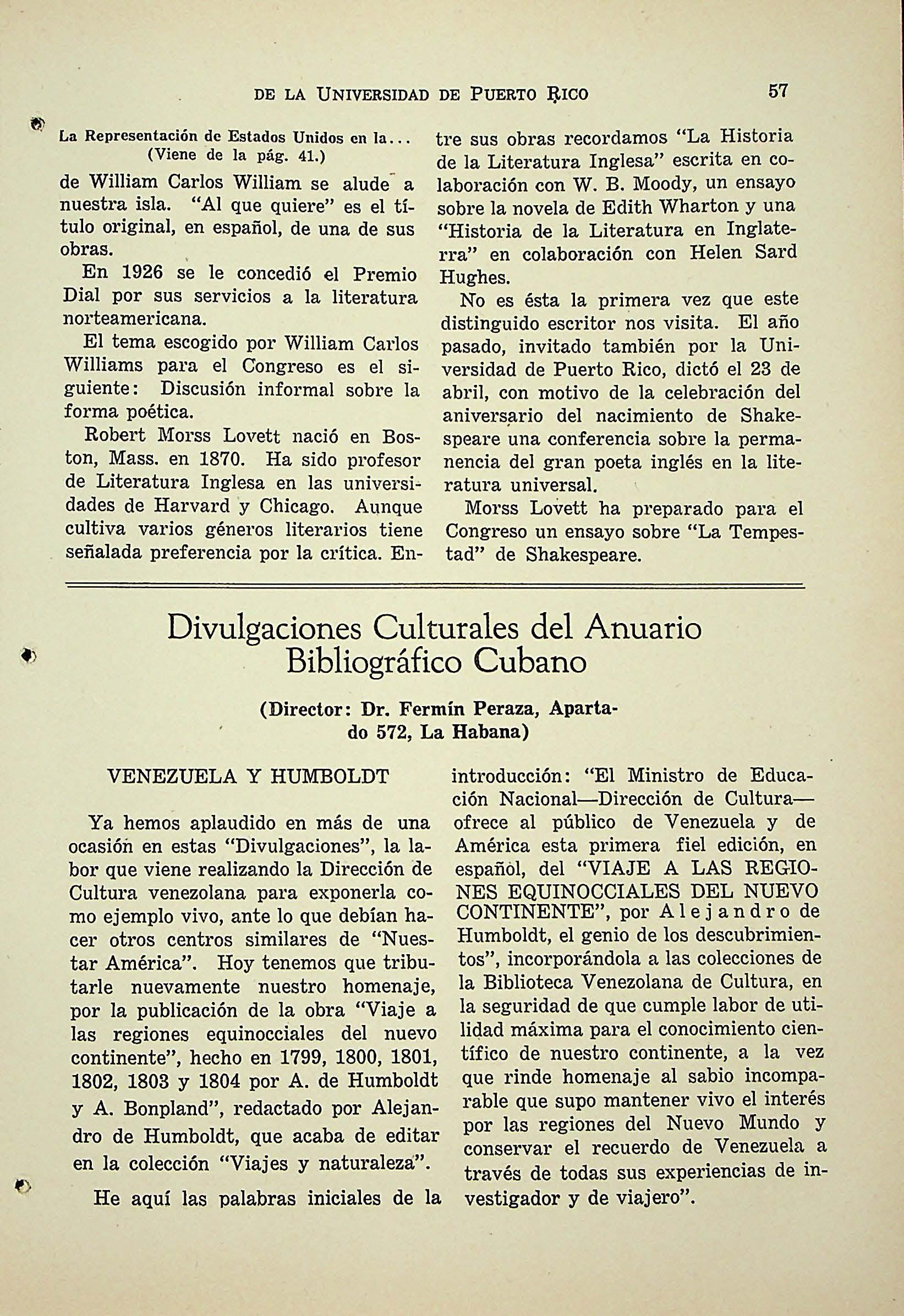
(Director: Dr. Ferrnín Peraza, Apartado 572, La Habana)
VENEZUELA Y HUMBOLDT introducción: "El Ministro de Educación Nacional-Dirección de Cultura
Ya hemos aplaudido en más de una ofrece al público de Venezuela y de ocasión en estas "Divulgaciones", la laAmérica esta primera fiel edición, en bor que viene realizando la Dirección de español, del "VIAJE A LAS REGIOCultura venezolana para exponerla mo ejemplo vivo, ante lo que debían cohaNES EQUINOCCIALES DEL NUEVO CONTINENTE", por A 1 e jan d ro de cer otros centros similares de "NuesHumboldt, el genio de los descubrimientar América". Hoy tenemos que tributos", incorporándola a las colecciones de tarle por la nuevamente publicación nuestro homenaje, de la obra "Viaje a la la Biblioteca Venezolana de Cultura, en seguridad de que cumple labor de utilas regiones equinocciales del nuevo liqad máxima para el conocimiento ciencontinente'', hecho 1802, 1803 y 1804 en 1799, 1800, 1801, por A. de Humboldt tífico de nuestro continente, que rinde homenaje al sabio a la vez incompay A. Bonpland'', redactado por Alejandro de Humboldt, que acaba de editar en la colección "Viajes y naturaleza". rable que supo mantener vivo el interés por las regiones del Nuevo Mundo y conservar el recuerdo de Venezuela a través de todas sus experiencias de inHe aquí las palabras iniciales de la vestigador y de viajero".



